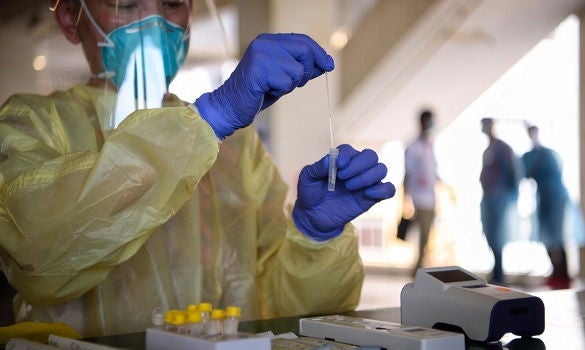
Scientists in Singapore, using an algorithm to predict the longevity of immunity to Covid-19, have found that it can last just 35 days in some people and up to four decades in others. The implications are that some people who have recovered from Covid-19 may still get reinfected, said Professor Wang Linfa, a corresponding author of the study. He added that this would limit the viability of a natural herd immunity strategy. Prof Wang, who is from Duke-NUS Medical School’s Emerging Infectious Diseases Programme, also said that assuming the immunity provided by vaccinations wanes like naturally produced antibodies, yearly Covid-19 vaccination may be needed. This is to prevent future outbreaks of the disease.
But in the study published in The Lancet Microbe on 23 March, he and the other scientists also pointed out that waning antibodies do not always mean waning immunity. People with low levels of neutralising antibodies may still be protected from Covid-19 if they have a robust T-cell immunity, they noted.
In the Singapore study, scientists from Duke-NUS Medical School, the National Centre for Infectious Diseases (NCID) and the Agency for Science, Technology and Research (A*Star) Infectious Diseases Labs followed 164 Covid-19 patients in Singapore for at least six months after their infection. During that time, they analysed their blood samples for neutralising antibodies against the coronavirus, as well as T-cells and immune system signalling molecules. They found that some people had neutralising antibodies - a key arm of the immune system - that waned quickly. In others, they decreased slowly. For some, the neutralising antibodies persisted.
Generally, the more ill the person was with Covid-19, the more likely his neutralising antibody levels will persist. Those who were mildly ill with the coronavirus saw their neutralising antibodies wane more rapidly. Using a machine-learning algorithm, the scientists projected that the longevity of coronavirus neutralising antibodies can be as short as 35 days to up to 41 years.
Prof Wang said the prediction of immune longevity can only be accurately determined at the individual level. To do this, three data points are needed.
"We need to take blood samples during the infection, three months after the infection, and six months after that, and we can predict if you are immune to Covid for how many months or years," he said.
In the study, the scientists sorted the patients into five groups. In the "negative group" were people - about 11.6 per cent of the patients in the study - who never developed detectable neutralising antibodies. The "rapid waning" group of slightly less than 27 per cent had varying early levels of antibodies that waned quickly. The "slow waning" group (29 per cent) tested mostly positive for antibodies at six months. Nearly one-third - the "persistent" group - showed little change in their antibody levels for up to six months after their infection.
Finally, there was an unusual "delayed response" group of three people. They actually showed a marked rise in neutralising antibodies months after recovering from severe illness.
"The key message from this study is that the longevity of functional neutralising antibodies against Sars-CoV-2 can vary greatly and it is important to monitor this at an individual level," said Prof Wang. "This work may have implications for immunity longevity after vaccination, which will be part of our follow-up studies."
The study had limitations, including the fact that the patients had a median age of 44 years. Older adults or children might have different immune profiles, the scientists said.
The study also found that patients from all groups, including those who did not have detectable neutralising antibodies, had sustained T-cell immunity six months after the infection.
Neutralising antibodies are important in protecting against Covid-19, but they are just a part of the immune response. The other parts include T-cells. Scientists are starting to see the importance of T-cells in the fight against Covid-19 as these cells can "maintain the "memory" of a pathogen for decades and will be rapidly recruited upon new infection, Professor Antonio Bertoletti, from the Emerging Infectious Diseases programme at Duke-NUS Medical School, said.
Prof Bertoletti was also involved in the study. In an earlier research, he and a team of scientists found that 23 individuals who had severe acute respiratory syndrome (Sars) in 2003 were recently all found to still have T-cells that recognise the virus that causes Sars, even 17 years after infection. Unlike antibodies, T-cells are harder to detect and study, and some classical vaccines, such as the seasonal influenza vaccine, mostly rely on antibody generation, said Prof Bertoletti. The knowledge that antibodies against Sars-CoV-2 wane in different people at different rates shows how important public health and social measures are in the ongoing pandemic outbreak response, said Associate Professor David Lye.
The director of the Infectious Disease Research and Training Office at NCID is also a corresponding author of the latest study. "However, the presence of T-cell immunity provides hope of longer-term protection, which will require more studies and time for epidemiological and clinical evidence to confirm," he added. Professor Laurent Renia, executive director at the A*STAR Infectious Diseases Labs, said the study is a reminder that people react differently to infections with different protective immune responses.
"Understanding the basis of these differences will help build better vaccines," said Prof Renia, a co-author of the study.













 Get it on Google Play
Get it on Google Play